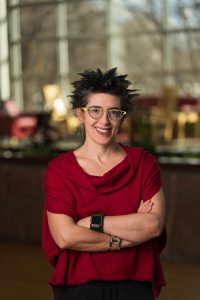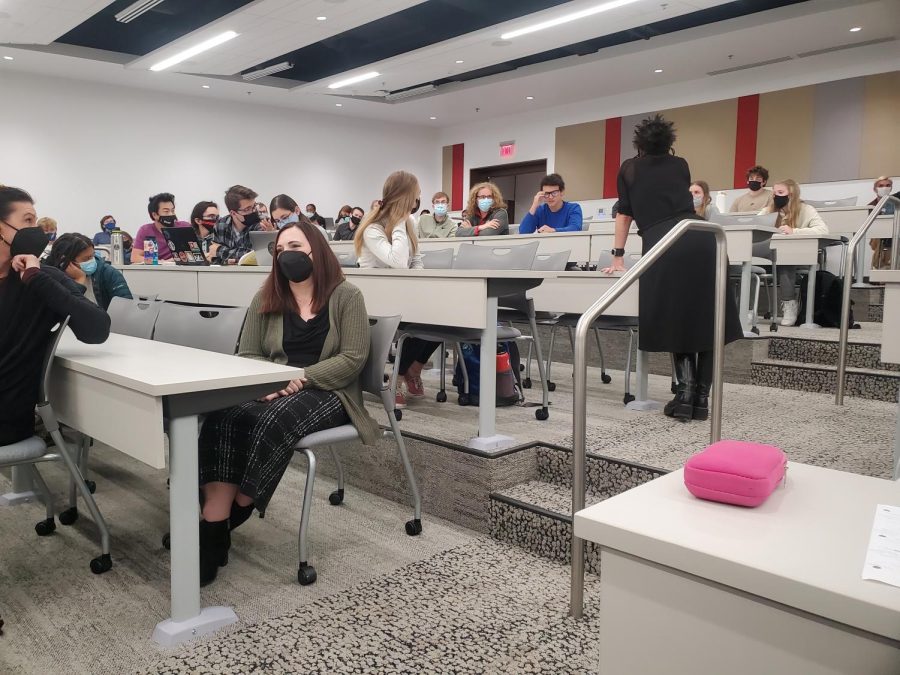‘Change means life’: Inevitable Exploration and Evolution in College
Professor Lisa Diamond teaches a Gender Studies class at the University of Utah in Salt Lake City on Oct. 20, 2021. (Photo by Rachel Rydalch | The Daily Utah Chronicle)
July 13, 2022
When Elizabeth Archuleta was pursuing her undergraduate degree in English, her professor took her under her wing and advised her on graduate school. From that mentorship, she remembers one piece of advice clearly: “Never get so comfortable in what you’re teaching that you laminate your lesson plans.”
The point being — the world changes, society changes, classes change and people change.
Between the traditional college ages of 18 and 25, many changes take place, such as personality traits fluctuating but then stabilizing with frontal lobe maturation.
This means capacities of self control — like following a schedule — are continually evolving during this period.
“The rhythms of your high school life are often shaped a lot by parents and family context, and so you get to college and then nobody’s telling you when to go to bed,” said Monisha Pasupathi, a University of Utah professor of psychology. “So I think one surprise for students is how challenging it can be to juggle those things themselves.”
College is a Sandbox
Pasupathi said struggling with self control and time management should not cause people to give up, because biology is on their side.
“When you mess things up early in your first year, it’s not indicative, it’s not a diagnosis,” she said.
According to Pasupathi, college is a major time for individuals to build their identity. Identity can be thought of in three main ways: sociological or group identities, chosen ideologies and beliefs and autobiography.
The third aspect of identity is integral to Pasupathi’s research interests — it entails the story of who an individual is and how they got to be that person.
What’s unique about autobiographical identity is that it extends into the future, and Pasupathi’s findings show that people’s memories are disproportionately centered in the college years, in a phenomenon called the reminiscence bump.
“[College is] also one of these incredible kind of crucibles within which this can happen because you are asked to make decisions, to explore options, to try things out,” she said. “So you’re sort of given a space and a kind of sandbox, within which it is your job to figure these things out.”
An implication of this uncertainty is that there may be periods of time when a traditional college-age individual feels unsure of many aspects of themselves such as who they are, what they know or why their interests have changed.
“And that actually makes sense because it’s part of the process — it isn’t fun, it can be kind of scary, but that’s actually appropriate to the age,” Pasupathi said. “It’s okay to hear things and think ‘Oh my god, does that undermine my whole faith?’”
The narratives Pasupathi studies often serve as solid anchors for individuals to understand who they are.
“But it isn’t a straitjacket … and that story evolves and changes for people’s whole lives,” she said. “So it gets revised, it gets retooled.”
Lisa Diamond, a distinguished professor of psychology and gender studies, researches sexual and gender fluidity, and said college can sometimes be the first time this identity questioning takes place. However, it most certainly is not the last.
“It’s not always when you’re a teenager — sometimes a lot of that exploration and discovery happens when you’re an adult,” she said. “And college is sort of a powerful trigger for that.”
Growing up, Diamond went to the same school from seventh to 12th grade, so college was a “firehose of newness.”
“That first week just being in the dorm … you couldn’t go to the bathroom without meeting someone who was unlike anyone else you’d ever met in your life,” she said.

Having all of these new experiences while one’s brain is still developing can be terrifying, according to Diamond. However, she wants college students to know they are not alone.
“That’s the other nice thing about college — if you’re like, ‘Oh my god, my brain just felt like it came off. Now, I don’t know what to believe,’” she said. “And you can sit across from someone who said, ‘You know what, I feel like that. Let’s get a cup of coffee.’”
In addition to talking to people about one’s discomfort, Diamond recommends finding a club or hobby that can become an anchor of community amidst the ever-shifting nature of college.
“Then that gives you a base of security, and then you can go and discover yourself knowing that there are people around you who will cheer you on,” she said.
In the sandbox that is college, students will surely meet different people and experience things they have never encountered before. According to Pasupathi, this makes change highly possible.
“Life throws changes but it just throws you fewer, I think, than when you’re in college,” she said.
Pasupathi said nontraditional students have the same ability to change in college, just in a smaller scope, as they have to take more commitments into account when making decisions.
“But if you come back, after having raised kids or, you know, run a small business or served in the military for a lengthier period of time, college still opens up these possibilities for change and for difference and for rethinking your past and your present and projecting into different futures,” she said.
Narratives of Change
Within Pasupathi’s research, she is interested in how people describe their everyday lives.
According to Pasupathi, narratives of change are not that difficult to get out of people. In her lab, one study entails observing conversations between pairs of people, and noting how they describe their day.
“I’m really interested in those stories and in the way that the audiences we have for those stories actually kind of impact them in ways that ultimately kind of help change who we are,” she said.
Archuleta experienced both a supportive and disapproving audience while pursuing her undergraduate degree. Before becoming a professor in the division of ethnic studies at the U, Archuleta wanted to become a computer scientist. She grew up poor and wanted to major in something that would ensure a solid financial future. However, her mom encouraged her to go into something she actually enjoyed, so she chose English.
“A lot of my family worked at Kennecott Copper Mine, and … my dad would always say, ‘Well, I’m working with my hands, you know, are you too good to work with your hands?’” she said. “And he was never proud of me going to college. My mom was, my grandma was, so you know, that’s what kept me going.”
Pasupathi said having a broad set of audiences can be helpful for students to figure out their path in life.
“Really spend time trying to cultivate the ability to talk to a lot of people about what you’re experiencing, what you’re loving, and what you’re hating and how you might make sense of that,” Pasupathi said.
In addition to talking to a wide variety of people about one’s interests and passions, Pasupathi emphasized the importance of being a listener for others to do the same.
An Ever-Shifting Status Quo
Archuleta teaches American Indian Experiences, a class where students sometimes come to fulfill a general education requirement and may have romanticized notions of what the class is about.
“This is a class about lived experiences,” she said.
Archuleta said it feels good when her students tell her they had a change in perspective because of the material.
As a part of the School for Cultural and Social Transformation, Archuleta believes one aspect of her job is to transform young lives.
One piece of Transform’s goal is to focus classes on those of marginalized identities because these topics have been ignored and invalidated in the public education system.
“We have people who are from minority communities, refugee communities, LGBTQ communities, who come in and their identities have never been validated,” she said.
Through its community engaged learning model, classes in Transform connect students to community organizations so they can make social justice changes.
“That’s how we figure we can work on transforming our communities, our states, our nation … one student at a time, based on … what they can contribute to make our communities better for everybody,” she said.
To Archuleta, change represents growth.
“One thing in Native American traditions is that change means life, because anything that’s not in the process of change is equal to death,” she said. “So, change is important.”
Never Laminate a Lesson Plan
Transform is in the process of designing an introductory course to address being a college student in a changing world.
“What does it mean to be doing education when the world is changing under our feet so rapidly?” Diamond said.
According to Diamond, the ways people talk about race, class and gender are changing more rapidly than ever before.
“So what does it mean to teach anything, if … the moment you teach it, it’s out of date?” she said.
Diamond said if she were to lay out her syllabi from over 20 years, it would display the history of the evolution in her own thinking about sexuality and gender.
“Maybe what college helps you do, is to cope with change, because it never, never ends,” Diamond said. “It’s like you’re walking on a treadmill and trying to cook dinner.”









